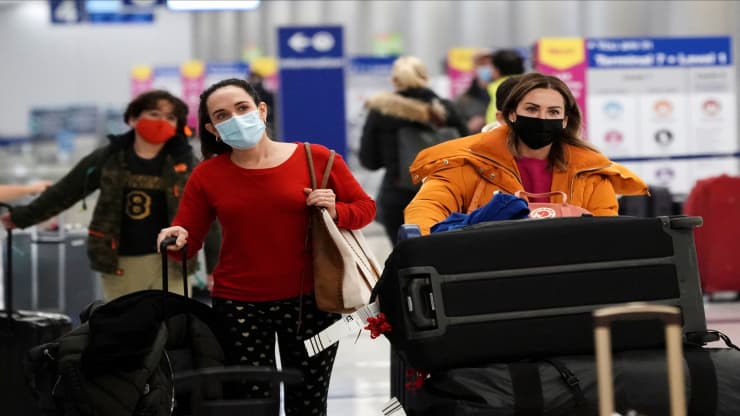Severe weather, omicron infections drive thousands more U.S. flight cancellations

Airlines canceled more than 2,600 U.S. flights on New Year’s Day as they faced severe weather across the country and a surge in omicron infections among staff that has disrupted air travel throughout the year-end holidays.
The issues won’t be resolved anytime soon. By Saturday afternoon, the airlines had already canceled more than 1,000 U.S. flights scheduled for Sunday. Since Christmas Eve, more than 13,700 U.S. flights have been scrapped and thousands more were delayed, according to flight-tracking site FlightAware.
The travel woes come during what airlines expected to be among the busiest days since the pandemic began. Last year, the Transportation Security Administration screened nearly 580 million people, up 79% from 2020 but still off about 30% from 2019 before the pandemic.
Southwest Airlines had largely escaped some of the severe disruptions that affected rivals over the holidays, but scrubbed 473 flights on Saturday, 13% of its schedule, according to FlightAware. More than 600 others were delayed. The airline suspended operations at Chicago’s airports as of 1 p.m. local time ahead of a severe winter storm.
Southwest has more than 200 daily departures from Chicago Midway International Airport. An airline spokeswoman said that the flights were cut because planners were “anticipating the gusty winds and blowing snow that decades of our history operating in this airport show us will slow down the airspace and also make deicing and getting aircraft back into the air very challenging.” The spokeswoman Southwest didn’t have staffing issues.
The Federal Aviation Administration also slowed traffic at Dallas Fort Worth International Airport, American Airlines’ largest hub, due to staffing. Earlier this week, the agency warned disruptions would continue.
“Weather and heavy seasonal traffic are likely to result in some travel delays in the coming days,” the agency said in a statement Friday. “Like the rest of the U.S. population, an increased number of FAA employees have tested positive for COVID-19. To maintain safety, traffic volume at some facilities could be reduced, which might result in delays during busy periods.”
While weather drove many of the cancellations on New Year’s Day, carriers including United Airlines, Delta Air Lines and JetBlue Airways have canceled hundreds of flights over the holidays, citing omicron infections among crews for many of the disruptions.
Airlines have ramped up incentives for pilots and flight attendants to pick up trips and ease staffing shortages that some executives say could last several more weeks as Covid cases continue to rise.
The Air Line Pilots Association, United pilots’ union, negotiated triple pay for aviators who pick up open trips through most of January, CNBC reported Friday. Flight attendants at United and both cabin crews and pilots at Spirit and others are also getting extra pay over the busy holiday period.
Airlines have tried to cancel flights ahead of time so that customers don’t get stuck at the airport, overwhelming ticket counters and scrambling to change their plans. JetBlue this week said it will cut 1,280 flights from its schedule through mid-January to avoid last-minute cancellations as omicron Covid infections sideline crews.
American, which operates a large hub out of Chicago’s O’Hare International Airport, canceled 208 flights, or 7% of its operation on Saturday, FlightAware data showed. Chicago-based United canceled 158, 7% of its mainline flights. Delta canceled nearly 200 flights, 9% of its Saturday schedule.
Airlines executives have said they expect travel demand to surge in 2022 and had been preparing to grow their schedules and scrambling to hire.
Southwest exceeded its goal of hiring more than 5,700 employees, including onboarded staff and extended offers, Greg Muccio, Southwest’s senior director of talent acquisition, wrote in a staff note on Thursday. The airline aims to have another 8,000 more employees next year.
The omicron variant is a new challenge for carriers, however.
“While we’re expecting a full recovery in 2022, it is going to be a year of two halves,” said JetBlue’s CEO Robin Hayes in a New Year’s Day staff memo, which was seen by CNBC. “Our traditional trough periods, especially these next few weeks after the holidays and as COVID-19 cases climb, are going to be tough.”
But Hayes said that JetBlue is expecting an “exceptionally busy summer and are planning to take advantage of this opportunity as we continue to expand our fleet and bring low fares to more routes.”